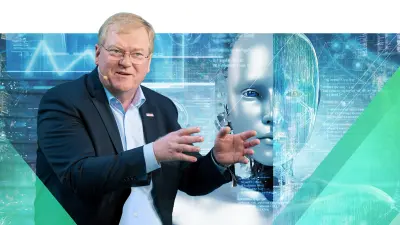Why Europe needs the very best AI

2024-04-24
When the world’s manufacturers gathered in Hannover recently, the hotels in the trade-fair city were fully booked as usual. But if we want that still to be the case in five or ten years’ time, then we have some hard work to do. Not because Hannover Messe will become less important. But because, instead of traveling there themselves, the visitors may prefer to send their digital twin or a hologram.
by Stefan Hartung

At the recent World Economic Forum in Davos, a fair few participants attended in 3D, even though they weren’t even in the room. And when we consider the speed at which artificial intelligence is progressing, it’s easy to imagine a virtual visit to a trade fair. With AI, yesterday’s impossible becomes today’s vision for the future.
At the same time, we’re experiencing a substantial discrepancy between a politically and economically tense global situation on the one hand and tremendous technological momentum on the other. It’s easy to overlook the fact that, over the long term, it’s AI more than anything else that will fundamentally change our world — even more so than the crises that are currently preoccupying us. But are we ready for this? Have we truly grasped how the technological structure of our world is changing? For me, the answer is no.
At the center of society
The subject of AI has now found its way into the heart of society, as our Bosch Tech Compass attests. This annual survey asks people in seven industrialized countries about their attitudes toward innovative technologies. Two out of three of this year’s respondents worldwide consider AI to be the most important technology of the coming years. This is a substantial increase of more than 20 percentage points over last year. Much of this increase may well be due to people’s enthusiasm for generative AI applications such as ChatGPT. But being able to ask our computer to write us a birthday toast or a CV isn’t the real revolution. Instead, the true potential of generative AI will be realized when it is able to analyze and describe images, spaces, and conditions much faster and more thoroughly than today.

In conjunction with the established methods of machine learning, this will open the door to completely new use cases. So far, AI has mainly imitated human cognition. With generative AI, however, we can now link cognition much more closely to the physical world of systems and machines. Take our plants, where we’re now generating synthetic images that then serve as the basis for AI-assisted visual inspection. AI accelerates AI, so to speak. And that means the gap between the future and the present is shrinking faster and faster.
As was plain to see in Hannover, the AI market is highly dynamic: above all, generative AI is crowding out old business models and fueling new ones — much as the computer or the internet did. And this momentum is so great that we have to think carefully about how we handle it. We cannot think of AI in purely technical terms. The political and social ramifications are too great for that. Its international regulation has been the subject of debate for quite some time, and rightly so: as with any technology whose consequences cannot be fully assessed, dealing with AI also calls for a great sense of responsibility.
AI has to be comprehensible
However, we should forget about trying to halt the global development of AI with regional or even local regulations. What the EU is proposing in its AI Act is an ethical step in the right direction. But at the same time, we should be wary of excessive bureaucracy. As we all know, the world turns faster than any bureaucrat’s swivel chair. And especially in the current political situation, it makes little sense to remain on the sidelines: until we can rule out the misuse of AI, we ourselves must be able to understand and apply every last ramification of AI. That’s why laws should define not the technology itself, but its correct use and application One example of this would be an obligation to label AI-generated content as such. Because new technologies will be most likely to prevail if they are comprehensible to users.

Rethinking is required
Transparency is the best weapon against manipulation and mistrust. And it helps counter the frequently overblown skepticism of technology that has been rife in Germany for many years. Pessimism and unwarranted fears are anathema to progress — so we need to snap out of this dangerous mood spiral as quickly as possible. One important first step here is a change in mindset: do we want to regard the future (and thus also AI) solely as a threat to the present, or do we want to open our eyes to the enormous opportunities that new technologies can bring for our economy and our prosperity?
But one word of caution: technology must never become an end in itself. Instead, it must always serve people. But responsibility doesn’t mean getting rid of AI altogether, nor does it mean despair. After all, speed limits weren’t invented before cars. What we need now in Germany and Europe is courage, a firm grasp on reality — and the will to be technology leaders. This applies in particular to how AI is used in manufacturing and to all applications that require heightened trust in decisions taken by algorithms. It is here that Europe's strengths and opportunities lie — and there is still time to exploit them.
This article was first published in German in the newspaper Handelsblatt.


